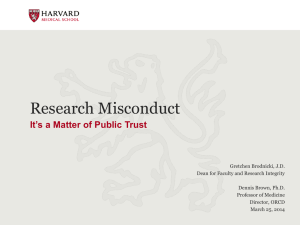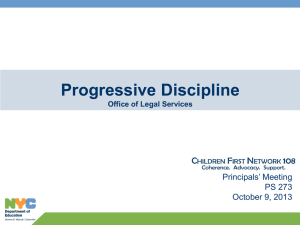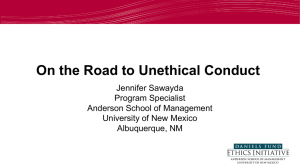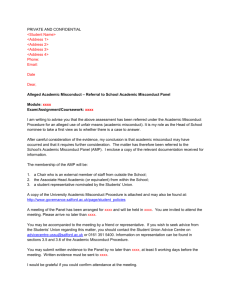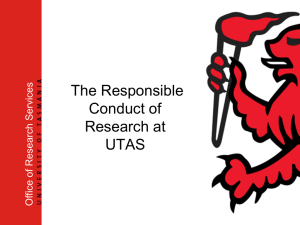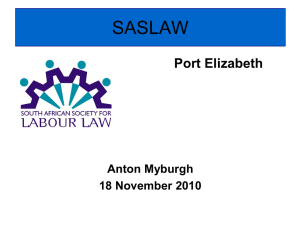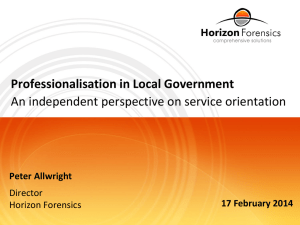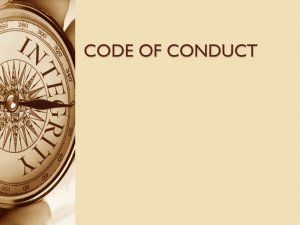Roundtable on Financial Misconduct 2013
advertisement
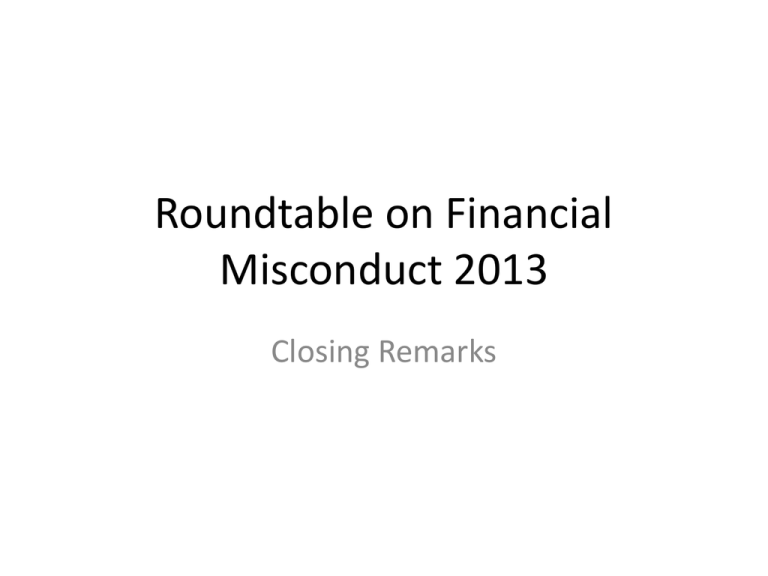
Roundtable on Financial Misconduct 2013 Closing Remarks Defining Financial Misconduct • Accounting Officers and officials will be guilty of financial misconduct if they, amongst others: • Fail to pay creditors within 30 days from receipt of a valid invoice • Fail to report unauthorised, irregular or fruitless and wasteful expenditure to the relevant treasury • Commit an act that undermines the department’s internal control system Defining Financial Misconduct • Process a payment without authentic and verifiable source documents • Introduce a new transfer to an institution without treasury approval • Fail to submit financial statements to the relevant treasury and to the Auditor-General within 2 months from year end (May) • Fail to disclose any direct/indirect personal or business interest in a bid • Abuse state equipment, including vehicles Types of Financial Misconduct Reported Corruption • Bribery Financial Mismanagement • Wasteful and fruitless expenditure • Failure to follow procurement processes • Payments to service providers without receivong goods Gross negligence • Loss of state funds/property • Not authorised to approve expenditure Theft Theft of • State funds; Laptops; Petrol; Petty cash; State property Misappropriation & Abuse • • • • Theft • Travel and subsistence claim fraud • Social Grant Fraud • Capturing fraudulent transactions Abuse of state property Damage to government vehicle Petrol card abuse Telephone abuse Managing the disciplinary process better • The AG argued that consequences are critical to reduce financial misconduct • Treasury’s Disciplinary Boards – Establish a panel of independent experts on state finance and public accounting to hear serious cases of financial misconduct – Treasury Instruction will be issued on circumstances when board hears charges – List of persons will be published as part of the circumstances when a board hears charges • DPSA’s central unit to support expedition of disciplinary cases • DPSA’s guideline on sanctions Key issues arising – way forward • The PSC is encouraged by the inputs and discussions of today • We hope that there are areas of shared understanding that have emerged to assist departments in managing financial misconduct • There is a need for further engagement between the Treasury and the PSC on a template for financial misconduct • Following this, a further engagement with this group on the template Key issues arising – way forward • The PSC will continue to put pressure on departments to recover funds lost through financial misconduct • We need to explore standing operating procedures for dealing with financial misconduct • There is a need for accounting officers to regards matters of financial misconduct as strategic management matters Key issues arising – way forward • Accounting officers must ensure that adequate resources are made available to deal with financial misconduct • The PSC will coordinate a meeting with other stakeholders in this area to ensure effective collaboration and avoid unnecessary duplication What is to be done? • Strong financial management and optimal use of resources will enable the country to better fight poverty, social inequality and unemployment • Focus on fighting corruption and eliminate waste and misuse of resources • Use financial misconduct reports to update risk registers • Provide regular feedback to management on cases of financial misconduct • Strengthen the political and administrative will to improve financial management and fight maladministration and corruption Major challenges 1: Building leadership that is: • Exemplary • Oriented towards the public interest • Inspirational • Authoritative • Innovative 10 Major challenges 2 • Ensuring professional ethics and dealing with financial misconduct in the public service is an ongoing priority but requires dedicated capacity and so resources are needed. • In a context of acute inequality and severe poverty, and the need to develop comprehensive government programmes to address these, making a persuasive claim for such resources is challenging. 11


